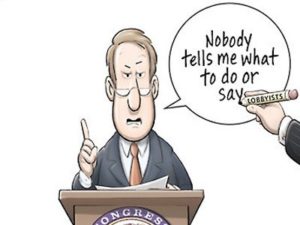What the &%$@# is a lobbyist, anyway?
Why do we need them? Who has them? What do they do?
Part 1 of 2. Part 2 coming later this week.
Like everything else that revolves around government, it depends. The PolicySmith at one time registered as a lobbyist, which was a big mistake, although not for reasons you might think. The reporting, the hairsplitting and the giant pain of filing arcane lobbying reports drove us nuts. We never registered again, and the designation ended up being superfluous to our actual vocation anyway.
Widely vilified and even more widely misunderstood, lobbyists perform a necessary and even vital function. Lobbyists are the leading practitioners of – and advocates for – one key provision of the First Amendment to the US Constitution – the right to petition government for redress of grievances. Any citizen who perceives being wronged by government has a right to be heard.
In the early days of our republic, petitioners waited in the lobby of meeting rooms to engage elected representatives – thus the term “lobbyist.” Office holders were buttonholed in hotel lobbies, bars and restaurant cloak rooms. Later when permanent offices were established in Washington, DC for Congress and Cabinet departments those lobbies were frequent meeting venues.
In today’s government – be it in DC or state capitals – meetings in lobbies are a quaint relic of the past, but the term stuck. There are three categories of lobbyists – the professional firms with their legions of attorneys and former legislators; trade association and NGO leaders who advocate for their membership’s/contributor’s interests; and, Government Affairs employees of businesses.
The first category of heavy hitters includes the few on the dark side — the Jack Abramoffs, the Billy Sol Estes of decades past, and others widely known for payoffs, influence peddling and other nefarious practices that gave lobbying its negative connotation. These are not as common as the public is led to believe, but some of the larger or more specialized lobbying shops may not be above this darker element.
The second has a richly earned checkered reputation, these are the likes of the American Tobacco Institute, American Petroleum Institute, AFL-CIO, Teamsters, NRA, Planned Parenthood, National Association of Broadcasters, Sierra Club, Wilderness Society, American Bar Association, ad infinitum. These mega-groups wield serious influence thanks to the breadth and wealth of their members/donors.
So, what about those laborers in the vineyard – those employees of private enterprise who are the face of their individual companies to government? Frequently these corporate types carry titles like Government Relations Representative/Manager/Director or Regulatory Affairs, Community Affairs or Corporate Relations rep. What they all share is an amorphous list of duties that can and often does defy clarity in the minds of management, fellow employees, spouses and friends. The spouse of the PolicySmith when queried about her husband’s job, would say she didn’t really know and couldn’t describe it…other than “It has something to do with oil and gas and government.”
The shared experiences among those of us (Disclosure – the PolicySmith was and is one) practitioners makes us a fraternity of fatalist cynics and experts in the dark art of gallows humor. The illusions about the best and brightest holding public office are quickly recognized for what they are – illusions. Relate Mark Twain’s pithy observation, “Diapers and politicians must be changed often, for the same reason,” and rarely does the company GR person evidence any sign of amusement. More often it’s a grimace and a knowing nod.
The certainties for all lobbyists are there will be legislation and there will be regulations. There will be hearings requiring expert testimony, committee staff seeking feedback on draft legislation and rule drafts to be reviewed and comment periods requiring response and public comment. The major interest groups will testify before committees, go with the TV ads and op-eds, the NGOs will gin up hysteria and letter writing campaigns, predictions of imminent doom, and the public will grimace and grouse about corporate influence and buying politicians. Meanwhile, the blocking and tackling of working the individual provisions of the legislation or the proposed rule-making largely fall to the individual Government Relations reps.
In Part II we’ll drill down into the activities of what practitioners laughingly refer to as “the lost souls” practicing Government Relations for individual commercial entities (private business!).
To read Part 2, click here.



[…] Part 2 of 2. To read Part 1, click here. […]
Are there guidelines and/or regulations as to how many lobbyists an industry or even a company or NGO has and on what issues they advocate for or against?
None — as many can be registered as are paid to do the work.